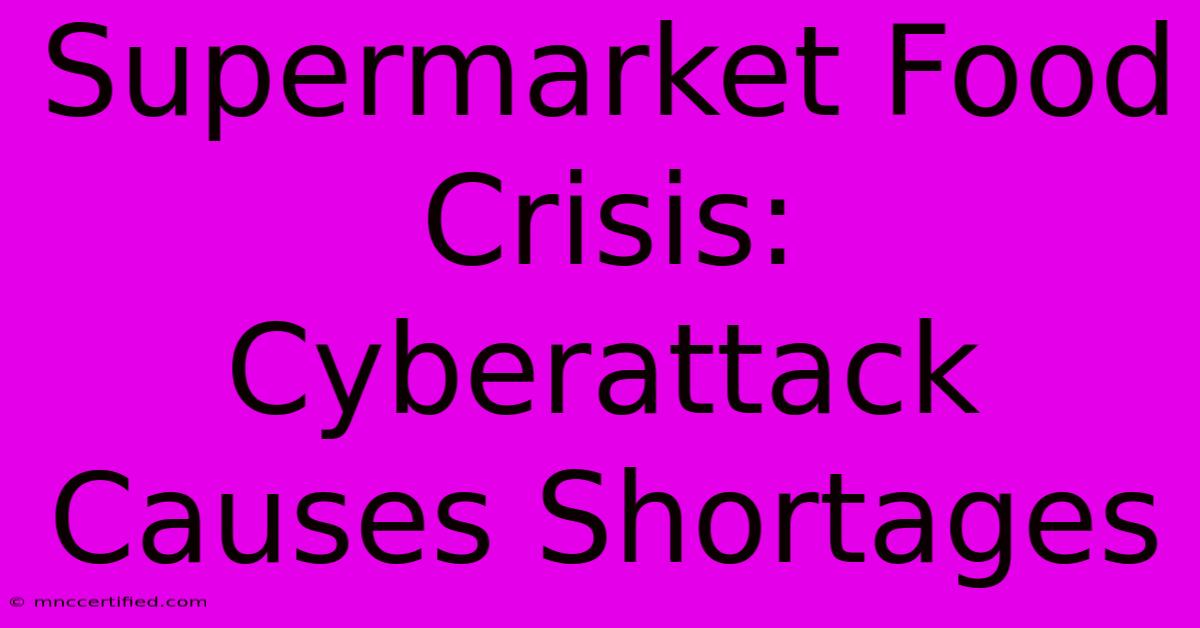Supermarket Food Crisis: Cyberattack Causes Shortages

Table of Contents
Supermarket Food Crisis: Cyberattack Causes Shortages
The unthinkable has happened: a devastating cyberattack has crippled major supermarket chains, leading to widespread food shortages and panic buying. This isn't a fictional disaster movie; it's a chillingly realistic scenario with potentially catastrophic consequences. This article explores the potential causes, impact, and preventative measures related to this emerging threat to our food supply chain.
The Cyberattack: How it Happened
While the specifics of any real-world attack would likely remain confidential for security reasons, we can examine the potential vulnerabilities exploited by cybercriminals. These attacks often leverage sophisticated techniques:
-
Ransomware: This malicious software encrypts crucial data, rendering systems unusable unless a ransom is paid. Imagine the impact on inventory management, ordering systems, and payment processing within a supermarket. A successful ransomware attack could halt operations entirely.
-
Supply Chain Attacks: Hackers could target suppliers, distributors, or even the transportation networks that deliver food to supermarkets. Compromising any link in the chain can create ripple effects, leading to significant disruptions.
-
Distributed Denial of Service (DDoS) Attacks: These overwhelm a system with traffic, rendering it inaccessible. This could cripple online ordering systems, point-of-sale terminals, and internal communication networks.
-
Data Breaches: Stolen customer data, including payment information and loyalty program details, could lead to financial losses and erode public trust. This would be compounded by the food shortages themselves.
Target Vulnerabilities:
Supermarkets are attractive targets due to:
- Extensive IT infrastructure: Modern supermarkets rely on complex networks of interconnected systems. A single point of failure can cause cascading effects.
- Large datasets: They hold vast amounts of sensitive data, from customer information to inventory details, making them juicy targets for data theft.
- Outdated security measures: Some older systems might lack robust security protocols, making them easier to exploit.
The Impact: Empty Shelves and Public Panic
The consequences of a large-scale cyberattack on supermarkets are far-reaching:
- Food Shortages: Disrupted supply chains lead to empty shelves, impacting consumers' access to essential goods.
- Price Inflation: Limited supply often drives up prices, disproportionately affecting low-income families.
- Public Panic and Social Unrest: Empty shelves can fuel panic buying and even social unrest, as people struggle to obtain basic necessities.
- Economic Losses: Supermarkets and their suppliers face significant financial losses due to disrupted operations and damaged reputation.
- Health Concerns: Reduced access to fresh produce and other essential foods can negatively impact public health.
Preventing Future Crises: Strengthening Cybersecurity
Preventing such devastating cyberattacks requires a multi-pronged approach:
- Investing in robust cybersecurity infrastructure: Supermarkets must invest in advanced security technologies, including firewalls, intrusion detection systems, and data encryption.
- Regular security audits and penetration testing: Regularly assessing vulnerabilities helps identify and address weaknesses before they can be exploited.
- Employee training and awareness: Employees need thorough training on cybersecurity best practices, including phishing awareness and password management.
- Incident response planning: Having a well-defined incident response plan in place ensures a swift and effective reaction to a cyberattack.
- Collaboration and Information Sharing: Sharing threat intelligence and best practices within the industry can strengthen collective defenses.
- Government Regulation and Support: Governments play a vital role in establishing cybersecurity standards and providing support for critical infrastructure protection.
Conclusion: A Wake-Up Call
The potential for a cyberattack to cripple our supermarket systems and create a widespread food crisis is a stark reality. Proactive measures, including substantial investment in cybersecurity infrastructure and robust incident response planning, are crucial to mitigating this risk and ensuring the continued stability of our food supply chain. This isn't just a technological issue; it's a matter of national security and public safety. Ignoring this threat would be a grave mistake.

Thank you for visiting our website wich cover about Supermarket Food Crisis: Cyberattack Causes Shortages. We hope the information provided has been useful to you. Feel free to contact us if you have any questions or need further assistance. See you next time and dont miss to bookmark.
Featured Posts
-
S Owns A Life Insurance Policy
Nov 27, 2024
-
This Morning Bonnie Blues Controversial Words
Nov 27, 2024
-
Fc Barcelona Brest Matchday Preview
Nov 27, 2024
-
London Underground Elizabeth Line Service Halted
Nov 27, 2024
-
Barcelona Star Threat Of Celta Vigo Absence
Nov 27, 2024